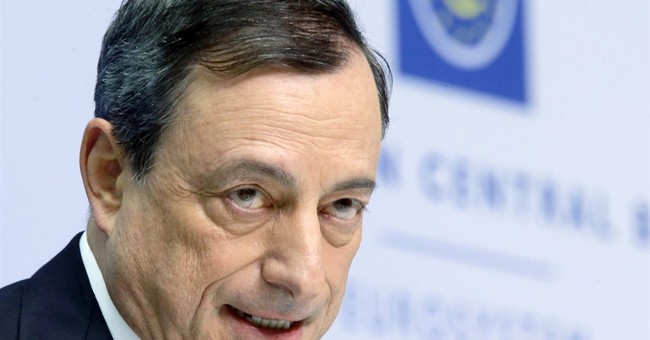
Posted on 01/24/2015 8:58:19 AM PST by Kaslin

In the wake of ECB's €60 billion a month QE madness (see "QE already Working" Says IMF Lagarde; Ho-Hum Details Announced; Gold the Place to Be), one might be wondering what it may do to European bond yields.
German 10-Year Bond Yield
image: http://3.bp.blogspot.com/-of_KecAryfU/VMKLTNvRyfI/AAAAAAAAcFk/6Kswiqag_hg/s400/German%2B10-Year%2Bbond%2Byield.png
click on chart for sharper image
Since September of 2013, yield on the German 10-year bond has plunged from around 2% to 0.367%.
ECB Risks German Bonds Mismatch Exceeding 100 Billion Euros
With €720 billion annual asset purchases, a huge portion of the bonds the ECB buys will be German.
Bloomberg explains ECB Risks German Bonds Mismatch Exceeding 100 Billion Euros.
[Of the 60 billion monthly asset purchases], about 45 billion euros probably would be sovereign debt, according to a central bank official, equating to more than 100 billion euros of German securities this year, based on purchases being conducted in proportion to euro-zone members’ contributions to the ECB’s capital. That would shrink the tradable market for German bonds in a year when the debt agency already planned to reduce the amount of conventional bonds outstanding by 8 billion euros.Just Can't Get Enough
“It’s going to cause a huge shock to the supply-demand balance in the European government-debt market,” Anthony Doyle, investment director at M&G Group Plc in London, said before the ECB’s decision was announced. “We might not be too far off the German bund market looking like the Swiss one, with a negative yield out to 10 years. It’s pretty crazy.”
ECB buying will be carried out in line with the capital key, Draghi said, which is a measure roughly in proportion to the size of each nation’s economy. Adjusted for non-euro-region central banks, that works out as a 25.6 percent share for Germany, according to calculations based on data on the ECB’s website.
If the ECB purchases about 450 billion euros of sovereign bonds over 10 months, about 115 billion euros would be earmarked for German debt. The exact amount has yet to be officially specified because the ECB plans to include debt of agencies and European institutions, as well as asset-backed securities and covered bonds in its purchases. As of Dec. 31, Germany had 1.16 trillion euros of tradable securities.
Finding Sellers
The difficulty for the ECB may be flushing out sellers and getting them to buy other assets instead. Banks and insurers need Germany’s AAA securities to bolster their balance sheets and pension funds mop up bunds to match their liabilities. In a low-growth environment with scant inflation, investors are sticking with bonds, particularly when the ECB is levying charges on its overnight deposit facility.
Meanwhile, supply is shrinking. The German debt agency plans to sell 147 billion euros of conventional bonds this year, compared with redemptions of 155 billion euros, according to its outlook published in December. As much as 14 billion euros of inflation-linked bonds, which are also eligible for ECB purchase, will also be issued.
“Global central banks are petrified of deflation,” said M&G’s Doyle, whose firm oversees the equivalent of about $389 billion. “The real effectiveness of QE is through the portfolio-rebalancing effect. The world is running out of positive-yielding government bonds.”
Well, then the world might run out of investors willing to buy government bonds.
This is why the big guys are in Davos working on how to monetize thin air under the guise of climate change.
Then we will soon be force-fed negative yield.
The “race to the bottom” is still on.
Japan has been the leader since the late 1980’s and their citizens still save while they can’t stop the Yen from going up.
Central bankers around the world have been trying to fight “deflation” with “inflation” since its the only tool they have, the printing press.
Safe money is wholly different than speculative money and the “safe money” is more concerned with their return of capital as opposed to their return on capital.
The world is flooded with “Safe money” because they don’t see very many real opportunities vs. the risk of losing money.
Not until there’s a major breakthrough in technology will this safe money really move. But when that breakthrough occurs or shows some real promise, the money will move so fricken fast that it will leave most people wondering if it’s to late to get in.
Buy Israeli War bonds.
Buy Kurdish War bonds.
Part of that search for safe money is why so many are buying investment real estate.
The Kurds have bonds?
Well why does America have to pay so much more to get people to buy it’s bonds?
The 10-year is below 1.8%, which is the lowest it's been in at least 53 years, which is as far back as my chart goes.
I'll guess the German rates are lower than US rates because German bankers are universally renowned for their anti-inflation mindset, plus, German government debt per capita is much lower than US government debt per capita.
Disclaimer: Opinions posted on Free Republic are those of the individual posters and do not necessarily represent the opinion of Free Republic or its management. All materials posted herein are protected by copyright law and the exemption for fair use of copyrighted works.